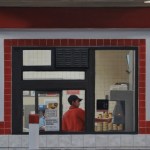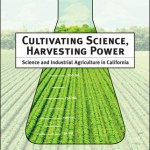Industrial agriculture
by Kim Krisberg
A couple years ago, two Johns Hopkins University public health researchers attended a public hearing about the possible expansion of an industrial food animal production facility. During the hearing, a community member stood up to say that if the expansion posed any hazards, the health department would surely be there to protect the people and alert them to any dangers. The two researchers knew that due to limited authority and resources, that probably wasn't the case.
"We felt like there was this false sense of comfort among the public," said Roni Neff, one of the two…
My current favorite news story is one by Reuters about an outbreak of e,coli in Germany attributed to organically grown bean sprouts with the ridiculous headline "E. Coli Outbreak Poses Questions for Organic Farming." Now it is absolutely true that there is a nasty outbreak of e.coli in Germany that has made thousands of of people sick, and caused 22 deaths. This is awful. But Reuters has a little accuracy problem as it leaps to attack organic agriculture:
The warm, watery, organic growing environment suspected as the source of a deadly E.coli outbreak in Germany may produce delicious,…
(Ten Best of the Decade from Half of the World's Fair)
This series began with the kindness of a friend who agreed to let me ask him about his book about Barry Commoner, science, and modern environmentalism. It then spawned a series of 17 interviews with authors of books in science studies, environmental history, the history of science, and all combinations in between. Every one of them was enjoyable to do; every author was generous and insightful. I've been able to use some of these as thumbnail sketches of readings I use in class. In that, they stand as the best example of blogging as a…
Continuing on with the ten best from half of the World's Fair, as noted earlier, this is a reprint of a post that first ran in January 2009. I had a lot of agro-food posts, many of them about Food Miles, but picked just one from that category for this list (and this one not about food miles).
In The Landscape of History, John Lewis Gaddis writes about the difference between reductionist research methods and ecological ones. Gaddis is a well-known and influential Cold War historian at Yale. This accessible and undergrad-suitable book is a brief foray into historiography and the practice of…
I mean that title in the positive sense of critique, like Kantian critique, intended to question so as to make better. I made note last month of a project some students here were doing, called "Is It Possible to Eat Sustainably at the University of Virginia?" This was the prompt:
Four Students set out to determine if it is possible to eat sustainably at UVA. Elizabeth will cover going vegetarian, Michael will cover going organic, Will will cover "The Six Dollar Limit", and Avik will cover going local. The conclusions of all four of us will help determine if eating sustainably is a viable…
Coming off of Ben's recent hat tip to the paper published at PLoS ("The Progressive Increase of Food Waste in America and Its Environmental Impact"), I was reminded of some great artwork by Marc Trujillo.
I first heard of this artist by reading a nice profile of his work at a newish online literary journal called "/ONE/" (link).
Marc Trujillo is an urban landscape painter who depicts the big box retail stores, self-service gas stations, and fast-food chains that make up a large portion of the urban environment. Free of political or moral overtones, these works function both as modern…
In "A hill of beans," The Economist reports that "the average American wastes 1,400 kilocalories a day." For those who would argue for industrial solutions to our food and agricultural problems because 'how else will we feed the world?,' I would argue that we first tackle problems of waste. Over-consumption leads to the problem of waste production . . . as pointed to by the study by "Kevin Hall and his colleagues at the National Institute of Diabetes and Digestive and Kidney Diseases," as reported in the article linked above.
"Urbanites Learn the Primal Lure of Hunting"
If you hunt a meal right beyond your backyard, well, that's the fewest Food Miles you're going to find. If you're not a hunter, well, someone ought to teach you. If you're urban or, let's just say it, bourgeois, then isn't this all so fun? The New York Times reports on this new gambit for reducing food miles and its happening right here in my own backyard. "The Urban Deerslayer" reports that hunting clubs are springing up, at least here in central Virginia, at least one. A class in Charlottesville called "Deer Hunting for Locavores" will teach…
Let's call this a public service announcement:
Wendell Berry will be visiting the University of Virginia in early December. He is the first in a series of four speakers for U.Va.'s Brown College Visiting Environmental Writer and Scholars (ViEWS) Lecture Series, 2009-2010. (As it happens, Rebecca Solnit, the subject here, is the third speaker in the series, next February; not to mention poet and philosopher Gary Snyder, next Spring.)
Berry will be giving a public reading at 5:30 PM on Thursday, December 3rd in the Small/Harrison Special Collections Library on campus. I'm told a reception…
Is It Possible to Eat Sustainably at the University of Virginia?
Eating sustainably requires (a) that you come to some resolution about what "sustainable" means, (b) that you have the opportunity to choose so-defined sustainable foods, and (c) that the constraints of your lifestyle, geography, and socioeconomic context make it possible for you to pursue such an endeavor. Threading the needle between all of that is tricky business. Thus many have chosen to run experiments about it, or related to the larger theme, defined in various ways: the "week without" processed food; the "week without"…
Joel Salatin's Polyface Farm is about a half hour from Charlottesville, give or take. His local prominence preceded the Omnivore's Dilemma bump of '06 and continues on after. Jane Black, the food writer for the Washington Post, wrote last year about the Chipotle franchise's decision to use Salatin's pigs as the sole source for their Charlottesville store's carnitas. I use her story in a few of my classes as an entry into the larger topic of local food, infrastructure, distribution, and land use.
Nightline ran a story last night about the Chipotle-Salatin partnership. I don't know how to…
Differences tabulated. In columns. And marked by me. I'll start above the fold with an excerpt:
The main distinctions are between a system that tends toward domination and one that strives for harmony; between that which seeks to specialize and that which promotes diversity; between promoting competition and seeking community and cooperation; and between that which is defined by values of speed, quantity, and profit and that defined by values of permanence, quality, and beauty. One prefers mechanistic identity, that is, the other ecological.
Here is the full table, as reproduced from…
In a post a few weeks ago, I included links to some current and recently passed legislation on food, food safety, and food labeling. One of them, H.R. 875 -- a bill "To establish the Food Safety Administration within the Department of Health and Human Services" -- has a particular devotion to "science" and "science-based" data and "science-based" practices. It's all so very post-Bush era. Debate about it is now starting to ramp up on-line.
But what got me thinking more about food and labeling was the Honest Tea Organic Honey Green Tea with 250 mg of EGCG Super Anti-oxidant I recently…
Add this to the list from my prior post: a Locavore app from Enjoymentland, available at the iTunes store. Local agricultural advocates are already using social networking and building virtual marketplaces and identifying market and farm sites nationwide. This feature extends the connection between on-line consumer practices and local food advocacy. Two of my students bought it and are giving it a test run. I'll try to get an update a few weeks into this Spring season.
According to the guy at Enjoymentland who made the app, the iPhone feature does this:
* Automatically detects which…
Just an accounting of the last month of local food, sustainable agriculture, and science/food/safety articles is difficult to produce. Let alone a full understanding of them. One problem with studying the topic is that the proliferation of literature on sustainable ag and its associated elements brings with it sifting and organizing difficulties. It's a microcosm of the problem of the internet itself - more information leads to more traffic, leading to slower travel. How to make sense of it all?
Here is a quick sampling of some recent literature on what we might call the current "food"…
Pt. I | Pt. 2 | Pt. 3 | Pt. 4
---
Part 4 with Christopher Henke, discussing his book Cultivating Science, Harvesting Power, follows below. All entries in the author-meets-blogger series can be found here.
WF: What do you make of the intersection of STS and agricultural studies?
CH: STS folks aren't often citing rural sociology, and vice-versa. I think the connections between these realms are greater than it might at first appear. Historians of science like Margaret Rossiter, Charles Rosenberg, and Deborah Fitzgerald were writing about agricultural science some time ago (as a sociologist…
Pt. I | Pt. 2 | Pt. 3 | Pt. 4
---
Part 3 with Christopher Henke, discussing his book Cultivating Science, Harvesting Power, follows below. All entries in the author-meets-blogger series can be found here.
WF: It's not just that you use Cooperative Extension as a case study of science, agriculture, and power, but that you provide some sharp detail on specific growers. In that vein, I liked your study of Spreckels quite a bit. The sugar beet grower. Could you speak to the basic arc of that case? What happens with Spreckel?
CH: The Spreckels case is actually one of my favorite parts of the…
Pt. I | Pt. 2 | Pt. 3 | Pt. 4
---
Part 2 with Christopher Henke, discussing his book Cultivating Science, Harvesting Power, follows below. All entries in the author-meets-blogger series can be found here.
WF: Now I can get back to the interpretive framework and your own concepts when understanding your empirical evidence. "Repair" is a guiding framework for you here, a way of approaching, understanding, and explaining your research findings. So what do you mean, repair?
CH: We use the term repair in everyday life to describe the process of fixing things---sociologists use repair as a…
The World's Fair is pleased to offer the following discussion about Cultivating Science, Harvesting Power: Science and Industrial Agriculture in California (MIT Press, 2008), with its author Christopher Henke. Henke is an assistant professor of sociology at Colgate University, an STS scholar, and a contributor to Colgate's environmental studies program.
Cultivating Science, Harvesting Power, says its publisher, "explores the ways that science helped build the Salinas Valley and California's broader farm industry." In doing so, Henke provides an account of "how agricultural scientists and…
In The Landscape of History, John Lewis Gaddis writes about the difference between reductionist research methods and ecological ones. Gaddis is a well-known and influential Cold War historian at Yale. This accessible and undergrad-suitable book is a brief foray into historiography and the practice of the historian's craft. His discussion of research methods comes along as he questions the social scientists' premise that one can separate dependent from independent variables, that one could hold all variables constant and look to just one to explain the rest. But all variables are…




